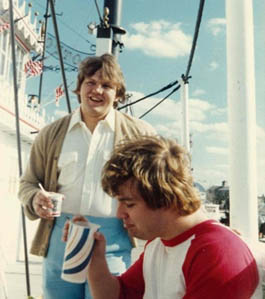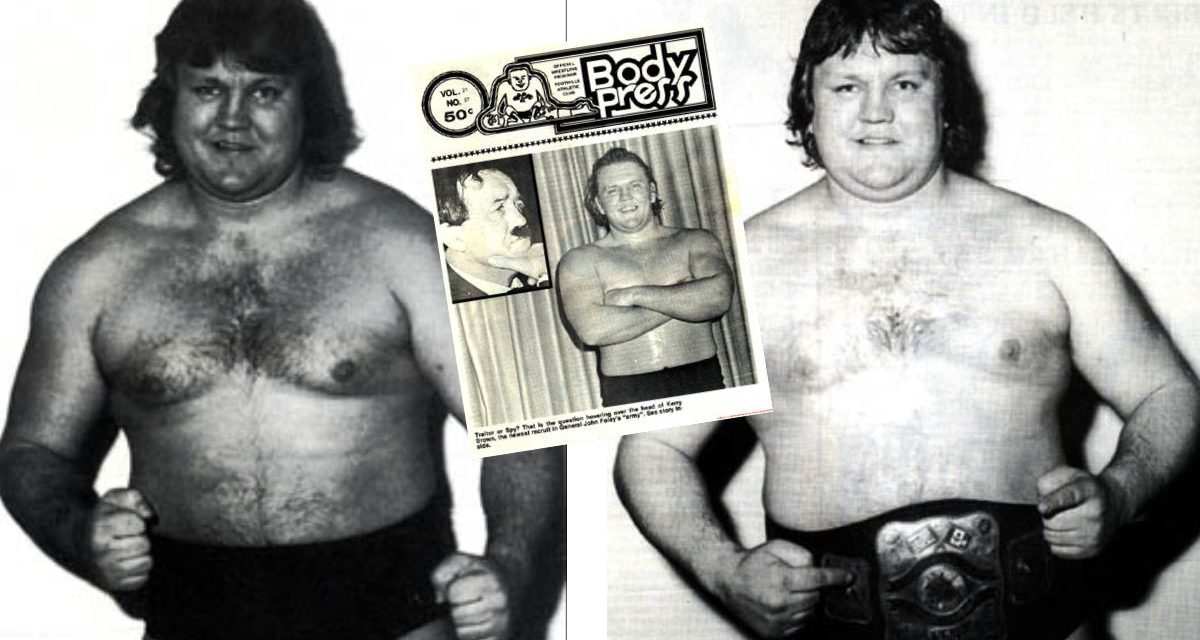Last month I had the unique experience of writing an anti-obituary — about the false reports of the death of Winnipeg wrestling promoter Tony Condello.
This afternoon, as I prepared to rush to Kick-FM for my drive-home talk show, I was flooded with simultaneous calls, texts, emails and Facebook messages, some asking me if it was true that Kerry Brown had died. As TJ Bratt called me to tell me the news he had just heard, there was Chi Chi Cruz on the other line. I immediately called Condello and he confirmed the sad facts, Kerry Brown found unresponsive in his bed Thursday morning, dead at age 51.

Eddie Gilbert and Kerry Brown at Worlds of Fun In Kansas City in the early ’80s. Photo by Darla Taylor.
The first time I met Kerry was, not surprisingly, as part of a night of drinking.
Dan Denton was in town for Christmas of 1991 from wherever he lived at the time — Mexico City, I think — and we were headed out on a tear to the usual haunts. He got in the car and announced we had a stop to make first, to pick up his old pal, The Pitbull.
I hit the brakes and suggested he was out of his mind.
Why was I antsy about picking Kerry up, you ask? Well firstly his uncle, the illustrious Bulldog Bob Brown, hated me. Lots.
I had been involved in shows competing with the WFWA, which Bob was booking into the toilet. He had gone so far as bury me and opposition promoter Walter Shefchyk on TV (which picked up our own houses nicely).
Given the fact we were trying to bring down the crooked provincial Wrestling Commissioner who Bob was friendly with, and the genuine dislike the two promoters had for each other, I was sure this was a bad idea.
Secondly, Kerry was an established international star. Japan, Puerto Rico, South Africa, the heyday of Stampede Wrestling, even Sam Muchnick’s St Louis promotion that I idolized. I, on the other hand, was a nobody who broke in with an outlaw promotion in the ’80s and never drew a dime.
Denton was surprised at my concern but assured me it would all be OK. Off we went to Kerry’s family home and after about 20 minutes of small talk skidding and sliding on Winnipeg streets to our first destination, the light bulb went on over Kerry’s head.
“YOU! It’s you! You’re him! You’re Martin!” I was fearing some sort of verbal assault but Kerry instead said he had wanted to meet me for some time because, as he reasoned, if Bob buried me so much, I must be a good guy. Like a reverse reference, Denton explained.
And off we went, for the first of many evenings I spent in the company of Kerry Brown, who became one of my best friends not only in the business, but in life. To which I owe Denton a huge debt.
Kerry, as I learned, was truly a kind-hearted guy, good humoured, surprisingly literate and well-informed, who told road stories the likes of which I had never heard before or since.
His first big card was at the hometown Winnipeg Arena against Greg Gagne in December 1979, shaking in his boots he said, then it was off to Bob Geigel’s Kansas City territory where he debuted along with another rising young star, Eddie Gilbert. Kerry was there in Japan the night Andre the Giant passed out after drinking 107 beers — he cracked that Andre would have loved getting booked to ANY country where beer was sold in vending machines. Being on the Quebec circuit (as Rick Valentine) with Pierre Lefebvre and manager Tarzan Tyler as tag terrors, before the two were killed in a car accident on Christmas Eve 1985. Working eight days a week for Emile Dupre’s Grand Prix wrestling, the hard miles, the fresh lobster…
He spent a lot of time at my office in the early ’90s screening old tapes, and we watched the match from a spring night in 1986 when he battled Bad News Allen on Calgary TV. It ended with a bloodied Kerry tossed off the top rope onto, but not through, a table in the middle of the ring, his 275 pounds landing on his neck and shoulder on the table’s edge; “I wasn’t kidding when I said to [Ed] Whelan I had a pinched nerve. I could barely stand up. Then I had to work on the road all week with it.”
Kerry watched over me, in secret of course, lest Bulldog Bob or Condello find out and de-book him. He told me what was being plotted and planned and gave me the heads up about the usual dirty tricks as Bob tried to kaibosh the opposition spot shows. Like I said, the local politicking was fierce but Kerry admired that I had not only stood up to the Commission, but had proven they had ripped off the local AWA promoters for about $70,000 in the 1980s.
That was money out of the boys’ pockets, and to him, despite my not having worked for an old-style territory and barely being a passable jobber, I was one of the boys in his eyes. That meant the world to me.
After awhile the ol’ Bulldog found out that we were pals and they had it out one day. The good news was, I didn’t have to park half a block from the house when I picked him up. The bad news was that I had to put up with the Bulldog giving me the evil eye out the living room window.
In 1994 Cruz and I took an opportunity to produce our own shows under Condello’s license, called Rough House Rasslin’. Kerry was the only guaranteed-pay worker on the shows, but he was gracious enough to suggest that beer could be substituted for cash at any time. The entire locker room, from bookers Cruz and Suicide Stan Saxon to Bruiser Bastien, Brian Jewel, Gene Swan, and a young Robbie Royce, had total respect for Kerry.
I had a vision for the events — to go the opposite route from the cartoon-era major league products of the time, and try to draw old-time fans — “A Theatresport tribute to old-style wrestling.” As a “big ugly slob” as he laughingly called himself, a tough guy like Kerry knew how to make the people believe, and he was my wise counsel, giving advice about poster styles, media campaigns and press the flesh appearances.
We matched him up with a total greenhorn — as in first match green — the tall, handsome Paul Marcoux. While pummeling Marcoux, the top turnbuckle popped off the corner. Showing the smarts of a world-traveled veteran, Kerry grabbed the turnbuckle pad and beat the living hell out of poor Paul, making the audible to change the finish to a disqualification. Naturally this set up a rematch, to Marcoux’ horror. On the following month’s show, Kerry made the decision to stretch Paul for nine minutes and 55 seconds before nailing the piledriver. When the bell rang signalling a 10-minute time limit draw he went ballistic and again got disqualified. Marcoux, by fluke, was 2-0 against the former North American Heavyweight Champion.
Before our third event, Cruz was almost killed in a boating mishap. Brown was insistent that Saxon and I continue and Brown helped rebook the shows. We were planning to film footage for a demo reel to shop around a TV concept, and he wanted us to succeed.
For the first time, he wrestled in a retirement match, pledging to beat “the undefeated” Marcoux in 11 minutes — since “I only needed one more minute to beat that punk last time here at the Junkyard.”
A few years ago BC videographer Adam Firestorm revisited the raw footage and has made a new edit available for this tribute. (The experienced eye will note Kerry trying to rib me by pulling the top rope into my crotch as I retreated through after making the introductions.)
Kerry was brilliant in guiding Marcoux through the bout, and Paul showed some guts as Kerry slammed him on the floor, rammed his back into the ringpost, punched him in the moosh, beat him half to death, and then the instant I announced “10 minutes, one minute remaining,” Kerry snared him into the piledriver and made the people — all of us — believe.
He needed all of 10 extra seconds to finish off the rookie, and knocked him out to boot. And boy did the fans hate him when he was done.
That was the thing with Kerry. He had wrestled in all the big arenas around the world, against the likes of Antonio Inoki, Dino Bravo, Bret Hart, Leo Burke, yet in a downtown Winnipeg bar that afternoon, he gave 100% and delivered the perfect heel performance, building to a crescendo with the last move. He loved the business and he loved to get in the ring. He looked like a bar fighter, bumped like a cruiserweight, had immaculate timing, and loved to teach the young boys the old school ways.
Kerry had a lot of bouts in this area against opponents like Cruz, Jewel, Swan, and even Jim Brunzell, that most fans never saw but which in my opinion, are as worthwhile to seek out video of as his bouts in the big territories. He was THAT good, and against experienced talent, he turned it up that extra notch. Area heels such as Evil Eddie Watts, Playboy Doug McColl and Denton himself looked up to Kerry as a genius of the craft. Even in the past few years, he would work the odd time on Condello’s Northern Death Tours and locally, passing on his knowledge and skills to Canadian hopefuls like Rob Stardom and Rawskillz. And lest I forget, referees like Kenny Rogers and Kelly Russell knew they were in for a treat anytime they officiated a match with him involved.
It isn’t well known that Kerry worked for a few years as an emergency child care supervisor for kids seized from their families by Child and Family Services. At that time the wards were being warehoused in hotels. The authorities knew that Kerry would command the respect necessary for the kids to stay in line. He also spent quite a few nights as a ‘bouncer’ in some of Winnipeg’s toughest hotels. Even inner-city gang members respected the presence of the former Stampede Wrestling legend and took their disputes outside.
It is no secret that Kerry never passed up an opportunity to have a beer. Which invariably turned to a six-pack. or more. He was an alcoholic and struggled with it. He loved to party and party he did. He was boisterous, comical, loyal and trustworthy. I had only spoken with him a few times since he assisted me with invaluable insight for the Manitoba Wrestling Study in 2003, as Kerry shared my commitment to safe and realistic training to prepare young men and women for a tough industry.
Privately, he confided his sadness at some aspects of his personal life, the burden of being under the shadow of his not-very beloved uncle, his deep love for his father. Kerry Brown was flawed, he was mortal, he died too young, perhaps never realizing how widespread and heartfelt the feelings of respect and love felt for him by successive generations of fellow wrestlers and his “followers”, as he called his fans, truly was.
I can honestly say that I never met a character like Kerry Brown, I loved him, and I am honored that he considered me his friend and colleague.
RELATED LINKS
- Nov. 11, 2009: Kerry Brown tribute show touches family, peers
- Sep. 28, 2009: Guest column: I remember … Kerry Brown
- Sep. 10, 2009: Kerry Brown dead at 51
- Apr. 2, 2004: Kerry Brown shoot worth a shot

